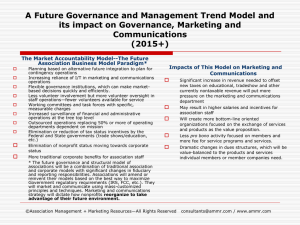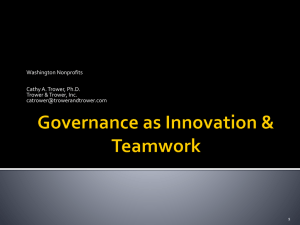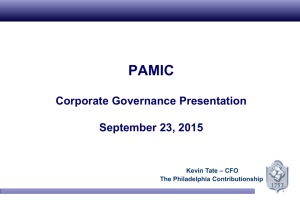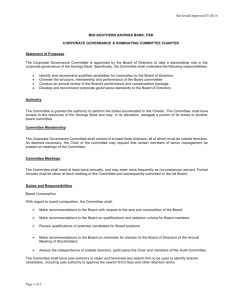Document 10420702
advertisement
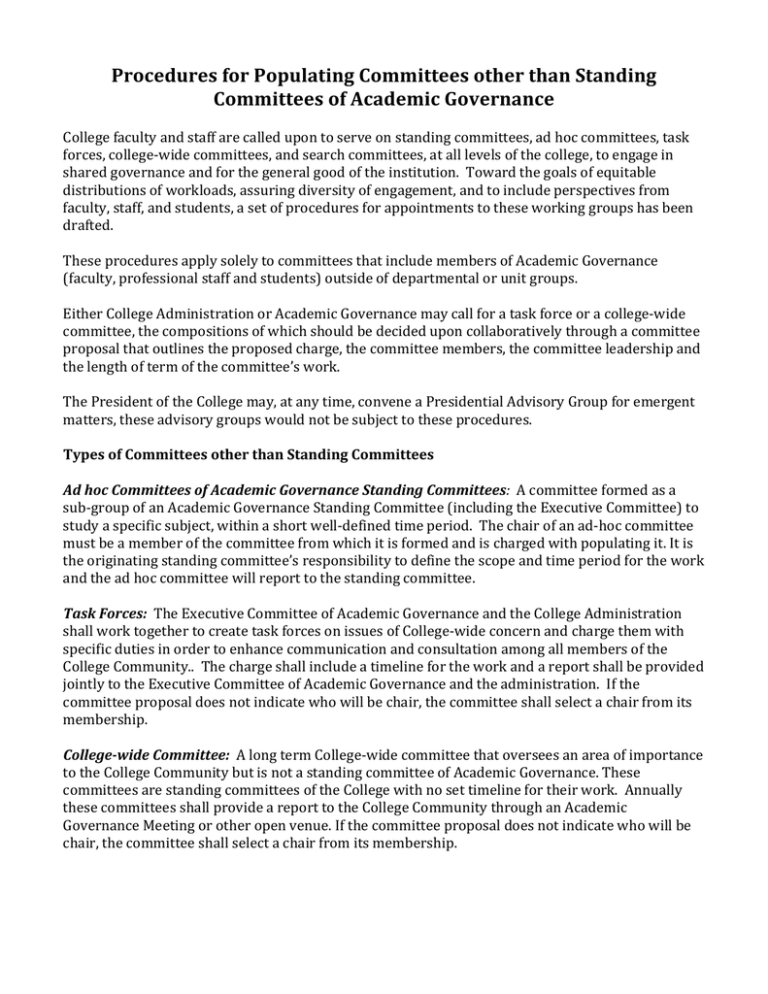
Procedures for Populating Committees other than Standing Committees of Academic Governance College faculty and staff are called upon to serve on standing committees, ad hoc committees, task forces, college-­‐wide committees, and search committees, at all levels of the college, to engage in shared governance and for the general good of the institution. Toward the goals of equitable distributions of workloads, assuring diversity of engagement, and to include perspectives from faculty, staff, and students, a set of procedures for appointments to these working groups has been drafted. These procedures apply solely to committees that include members of Academic Governance (faculty, professional staff and students) outside of departmental or unit groups. Either College Administration or Academic Governance may call for a task force or a college-­‐wide committee, the compositions of which should be decided upon collaboratively through a committee proposal that outlines the proposed charge, the committee members, the committee leadership and the length of term of the committee’s work. The President of the College may, at any time, convene a Presidential Advisory Group for emergent matters, these advisory groups would not be subject to these procedures. Types of Committees other than Standing Committees Ad hoc Committees of Academic Governance Standing Committees: A committee formed as a sub-­‐group of an Academic Governance Standing Committee (including the Executive Committee) to study a specific subject, within a short well-­‐defined time period. The chair of an ad-­‐hoc committee must be a member of the committee from which it is formed and is charged with populating it. It is the originating standing committee’s responsibility to define the scope and time period for the work and the ad hoc committee will report to the standing committee. Task Forces: The Executive Committee of Academic Governance and the College Administration shall work together to create task forces on issues of College-­‐wide concern and charge them with specific duties in order to enhance communication and consultation among all members of the College Community.. The charge shall include a timeline for the work and a report shall be provided jointly to the Executive Committee of Academic Governance and the administration. If the committee proposal does not indicate who will be chair, the committee shall select a chair from its membership. College-­‐wide Committee: A long term College-­‐wide committee that oversees an area of importance to the College Community but is not a standing committee of Academic Governance. These committees are standing committees of the College with no set timeline for their work. Annually these committees shall provide a report to the College Community through an Academic Governance Meeting or other open venue. If the committee proposal does not indicate who will be chair, the committee shall select a chair from its membership. Academic Administrative Search Committees:1 Search committees for positions Dean and above, with the exception of Presidential Searches which shall follow the SUNY Board of Trustees Guidelines.2 Provostial searches shall have majority representation from faculty (including academic department chairs), at least one member of the professional staff, and at least one member of the student body. Faculty and students should be represented on all administrative searches where the primary duties of that position are to work closely with faculty and students or where consultation with Academic Governance is required by the SUNY Policies of the Board of Trustees. The College President shall appoint the chair of any administrative search committee. Populating Committees Ad hoc Committees of Academic Governance Standing Committees (includes Executive Committee) The chair of the ad hoc committee should make a general call for volunteers from the standing committee. The chair may recruit from the college community if additional expertise is needed. Task Forces A task force may be filled by a call for volunteers to the members of Academic Governance by the Secretary of Academic Governance. Proposed membership of the committee will be presented to the Executive Committee of Academic Governance and the College Administration, and changes may be made to achieve balance(workload, expertise, etc.) and diversity. The final committee membership will be reported at a College-­‐wide Academic Governance Meeting. In cases where the size of the Task Force is limited, the following procedure will be followed: 1. A call for volunteers is made to the College by the Secretary of Academic Governance. 2. Two people from Academic Governance Executive Committee and two people from the College Administration (one of whom is the originator of the committee request) appoint members to the committee with attention to balance and diversity. It is also expected that before appointments, that the originator will solicit the input of the potential committee members immediate supervisor. 3. The committee composition is forwarded to Academic Governance Executive Committee and to the College Administration for review and comment. 4. If there are no changes after step 3, the committee is announced at the next Academic Governance Meeting, if there are suggested changes, the comments are sent back to the group in step 2 for review and response until all are satisfied in step 3. 1 SUNY Policies of the Board of Trustees. Article IX, Title B, section 2, Appointment: Appointments of all college administrative officers and professional staff not in a negotiating unit established pursuant to Article 14 of the Civil Service Law shall be made by the chief administrative officer of the college; such appointment shall be reported to the Chancellor. Appointment of academic officers such as vice-­‐president for academic affairs, academic deans and others with similar responsibilities shall be made after consultation with the faculty. 2 Presidential Searches shall follow the SUNY Board of Trustees, “Guidelines for the Selection of a President When a Vacancy Occurs at a State-­‐operated Campus of the State University of New York,” http://system.suny.edu/media/suny/content-­‐assets/documents/faculty-­‐ senate/GUIDELINESFORPRESIDENTIALSEARCHESFinal.pdf last accessed 10/14/15. College-­‐wide Committees Appointments to college-­‐wide committees will follow the same rules as for Task Forces. Since College-­‐wide Committees may have long-­‐term work assignments, appointment shall be made for three-­‐year terms. When terms expire, openings are filled by an open call for nominations. Academic Administrative Search Committees Nominations to fill the seats allocated for faculty, staff, and students will be solicited through an open call to the College Community. Elections will be held to inform the Executive Committee of Academic Council. The Executive Committee of Academic Governance is then charged with ensuring balance and diversity on the committee while respecting the preferences of the membership reflected in the votes. The recommended membership of the committee will be presented to the Executive Committee of Academic Governance and the College Administration for approval. The final membership of the committee will be reported at a College-­‐wide Academic Governance Meeting. Bibliography SUNY Fredonia, Faculty Governance Bylaws: https://docs.google.com/document/d/1wn2L4A7y_psBTk7AqRq4E2FDNJVw7oT_cbkd7V_kH3k/e dit SUNY Oswego, Faculty Governance Bylaws: http://www.oswego.edu/academics/faculty/assembly/bylaws.html Washington State University: https://news.wsu.edu/announcement/faculty-­‐senate-­‐seeks-­‐ committee-­‐members/ University of Arizona: http://facultygovernance.arizona.edu/Committees Lessons Learned: Reflections of a University President, (2010) William G. Bowen, Princeton University Press. Governance Reconsidered: How Boards, Presidents, Administrators and Faculty Can Help Their Colleges Thrive (2014), Susan Resnick Pierce, Jossey-­‐Bass. Date adopted by Executive Committee unanimous vote: 12/7/15.


